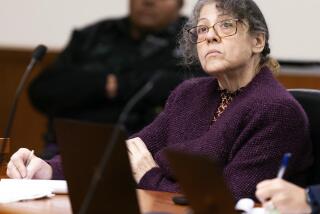1st-Degree Murder Ruled Out in Grocer Trial : Courts: Judge says Korean-American woman should face no more than a second-degree penalty in shooting of black teen-ager.
- Share via
In a decision that drew both praise and anger, a trial judge ruled Thursday that a Korean-American merchant should not face a first-degree murder conviction for shooting a black teen-ager because there was insufficient evidence that the slaying was premeditated.
Superior Court Judge Joyce A. Karlin, whose ruling came after three days of testimony in the case, agreed with defense attorneys that Soon Ja Du should face penalties for no more than second-degree murder or such lesser offenses as voluntary or involuntary manslaughter.
Upon hearing the judge’s ruling, which was made out of the jury’s presence, Du bowed her head and sobbed loudly.
Under California law, to convict Du of first-degree murder in the March 16 shooting of 15-year-old Latasha Harlins, a jury would have to find that she acted with malice and premeditation.
Deputy Dist. Atty. Roxane Carvajal argued at the hearing Thursday that Du had the “intention to kill” Latasha after the girl “retreated.” She said that “deliberation and premeditation can occur in a matter of seconds.”
The judge responded that there was “insufficient evidence to sustain a conviction on first-degree murder, but there is sufficient evidence for the lesser . . . charges.” She said she will instruct the jury on her ruling before the panel begins deliberations next week.
A first-degree murder conviction could have carried a maximum sentence of 25 years to life for Du, who is accused of shooting Latasha in the back of the head after the two scuffled over a $1.79 bottle of orange juice. Should the jury convict Du of second-degree murder--with a special allegation that she used a handgun--her sentence could range from 15 years to life in prison.
Du’s family members had no comment. But members of the Harlins family said they were disappointed and angry.
Latasha’s father, speaking through his lawyer, Geraldine Green, called the ruling “outrageous” and insisted that the shooting was “cold-blooded murder.”
“I think the judge basically abused her discretion,” said Leon Jenkins, a lawyer who plans to file a civil suit against the Dus on behalf of Latasha’s maternal grandmother and aunt. “Technically she can do what she did, but I feel there was more than ample testimony and evidence to support a first-degree murder conviction.”
The shooting has been the most emotionally charged of several violent encounters between blacks and Korean-American store owners in South-Central Los Angeles. The confrontations prompted at least two boycotts. The Empire Liquor Market on South Figueroa, where Latasha Harlins was killed, has not reopened since the shooting.
The second boycott was resolved Thursday night with ratification of a far-reaching agreement between black leaders and Korean merchants to head off future tensions.
Danny Bakewell, who organized the boycott of the Du store and was instrumental in crafting Thursday’s agreement, said the ruling was tragic.
“It’s the kind of thing that I feel causes the African-American community to feel that it is getting railroaded by the justice system,” he said. “I’m not a lawyer, but based upon what I have seen, it doesn’t seem that it will bring the kind of justice Mrs. Du should be caused to confront.”
In testimony on Wednesday, Du said the shooting occurred after she accused Latasha of trying to conceal a bottle of orange juice in a backpack. Du said that when she grabbed the teen-ager’s sweater to retrieve the bottle, the girl struck her in the face several times, knocking the grocer to the floor.
As she rose, Du said, her hand came to rest on a gun under the cash register and she picked it up without thinking. Although a store security camera shows her shooting Latasha as the teen-ager appears to be walking away, Du said she had no recollection of firing.
Steve Kim, a reporter with the Korea Central Daily, a 70,000-circulation Korean-language newspaper, said most Koreatown residents the paper interviewed about Thursday’s ruling were pleased.
“They said they were glad the judge has decided to cut (the sentence) down to second-degree murder,” Kim said. He added that “they think it should be involuntary manslaughter or self-defense.”
More to Read
Sign up for Essential California
The most important California stories and recommendations in your inbox every morning.
You may occasionally receive promotional content from the Los Angeles Times.













